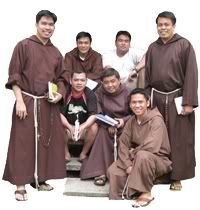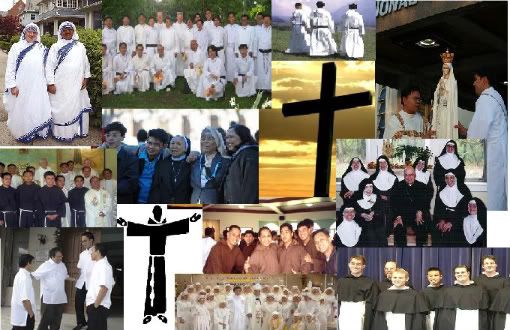“It is well for a man to have borne the yoke from his youth,” says Holy Scripture. Mindful of this counsel, and realising that the pure heart of the young receive the impressions of virtue without difficulty, and easily form good habits, that it is above all the time of earnestness and generosity, the Church has always encouraged her children to give themselves to her service from their tender years. The Council of Toledo laid it down: “As soon as a child has arrived at adolescence, that is to say, at the age of twelve for girls and fourteen for boys, they may freely dispose of themselves by entering religion.” It is not forbidden to enter at any age; the Council of Trent simply ordained that no one should be admitted to profession before the age of sixteen years completed, but it did not forbid entrance before that time. Special provision was made in the Rule of St. Benedict for the admission of little children, who were offered by their parents to be educated and thereafter perpetually to persevere in the Order. “The reception of a child in those days was almost as solemn as a profession in our own. His parents carried him to the church. Whilst they wrapped his hand, which held the petition, in the sacred linen of the altar, they promised, in the presence of God and of His Saints, stability in his behalf. Little beings of three or four years old were brought in the arms of those who gave them life, to accept at their bidding the course in which that life was to run. They were brought into the sanctuary, received the cowl, and took their places as monks in the monastic community.” St. Benedict was only twelve when he entered the cloister, and St. Thomas of Aquinas barely fourteen. St. Catherine of Ricci was professed at thirteen; Blessed Imelda died in a Dominican Convent at the age of eleven, and St. Rose of Lima had vowed her chastity to God while only five. In our own days Sœur Therese, “The Little Flower,” was scarcely fifteen when she entered the Carmelite monastery at Lisieux. “The Spirit breatheth where He will.” There is no rule for vocations, no age-limit for the Call. Innocence attracts the gaze of God, deep-rooted habits of sin, provided they are not persevered in, do not always repel Him. One comes because of the world disgusts him, another loves it and leaves it with regret; docility draws down more graces, while resistance often increases the force of his invitation. The little child hears His whisperings, while others have not been summoned till years were far advanced. So jealous is the Church of this liberty for her children that the Council of Trent excommunicates those who, by force or fear, hinder anyone from entering religion without just cause. As parents often exceed the authority given them by God over their children, in the question of a choice of life, it will be well here to quote the words of the great Jesuit Moralist, Father Ballerini: “Paternal power cannot take away the right which sons and daughters have to make their own choice of a state of life, and, if they will, to follow Christ’s Counsels. The duty, however, which filial piety demands ought not to be disregarded, and the leave of parents ought to be asked. If it is refused, their children ought not at once to take their departure, but should wait for some little time till the parents have realised their obligations. If, however, there should be danger of the parents unjustly hindering the fulfillment of their children’s vocation, they may and ought to go without their parent’s knowledge. Parents have a right to make some trial of the vocation of their children before they enter; it is not, however, lawful for them to insist that they should first taste the pleasure of the world. If they should happen to be affected by these, the parent would not have reason to conclude that there had not been a true vocation. There may be a true vocation which has been wrongfully abandoned.” St. Liguori quotes a number of theologians who hold that “Parent who prevent their children from entering religion sin mortally. To turn one from a religious vocation,” says St. Jerome, “is nothing else than to slay Jesus Christ in the heart of another.”
skip to main |
skip to sidebar

CAPUCHINO.
FRANCISCANO.
PILIPINO.
The Capuchin Friars Minor is a religious community of Priests and Brothers living in Gospel Brotherhood, Prayer and Contemplation, Minority, Simplicity and Joy! If you are at least 18 years old and at least a second year college/vocational student,
WE INVITE YOU TO JOIN US!
Board and lodging and tuition scholarships are offered to all accepted applicants.
CAPUCHIN VOCATION OFFICE
Sta Teresita del Nino Jesus Parish
43 Kanlaon St., Sta. Mesa Heights, Quezon City
(02) 731 5044, (02) 731 9227, 0917 815 8133
bokasyongcapuchino@gmail.com
capvoc@yahoo.com.ph
Archives
- vocation resources (19)
- vocation videos (3)
- religious orders (men) (2)
- vocation (2)
- definition of terms (1)
- franciscan family (1)
- information (1)
- message (1)
- pope (1)
- prayer (1)
- religious formation (1)
- world (1)
WHAT'S YOUR CALLING?
"You have not chosen me: but I have chosen you; and have appointed you, that you should go, and should bring forth fruit; and your fruit should remain."
(John 15:16)
(John 15:16)
Prayer to Follow Christ's Call
Lord, I thank you for the gifts you have given me, especially for life, love, family and friends. Help me to know myself better and my talents. As I pray, study and decide on my life's work, help me see and understand the path you open for me. Help me choose a life's work, which will be in response to my potential and your love. If I am invited to follow you as a Priest, a Monk or Nun, a Religious Brother or Sister, Missionary or Lay Consecrated, give me a generous heart to respond to your challenging call ang the strength to follow You whatever you lead me.
AMEN!
(Adopted from the Daugthers of Divine Zeal Philippine Delegation)
AMEN!
(Adopted from the Daugthers of Divine Zeal Philippine Delegation)
CBCP News
Catholic World News
BUHAY CAPUCHINO!

CAPUCHINO.
FRANCISCANO.
PILIPINO.
The Capuchin Friars Minor is a religious community of Priests and Brothers living in Gospel Brotherhood, Prayer and Contemplation, Minority, Simplicity and Joy! If you are at least 18 years old and at least a second year college/vocational student,
WE INVITE YOU TO JOIN US!
Board and lodging and tuition scholarships are offered to all accepted applicants.
CAPUCHIN VOCATION OFFICE
Sta Teresita del Nino Jesus Parish
43 Kanlaon St., Sta. Mesa Heights, Quezon City
(02) 731 5044, (02) 731 9227, 0917 815 8133
bokasyongcapuchino@gmail.com
capvoc@yahoo.com.ph







